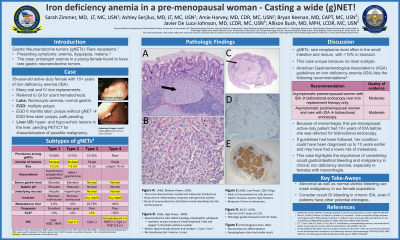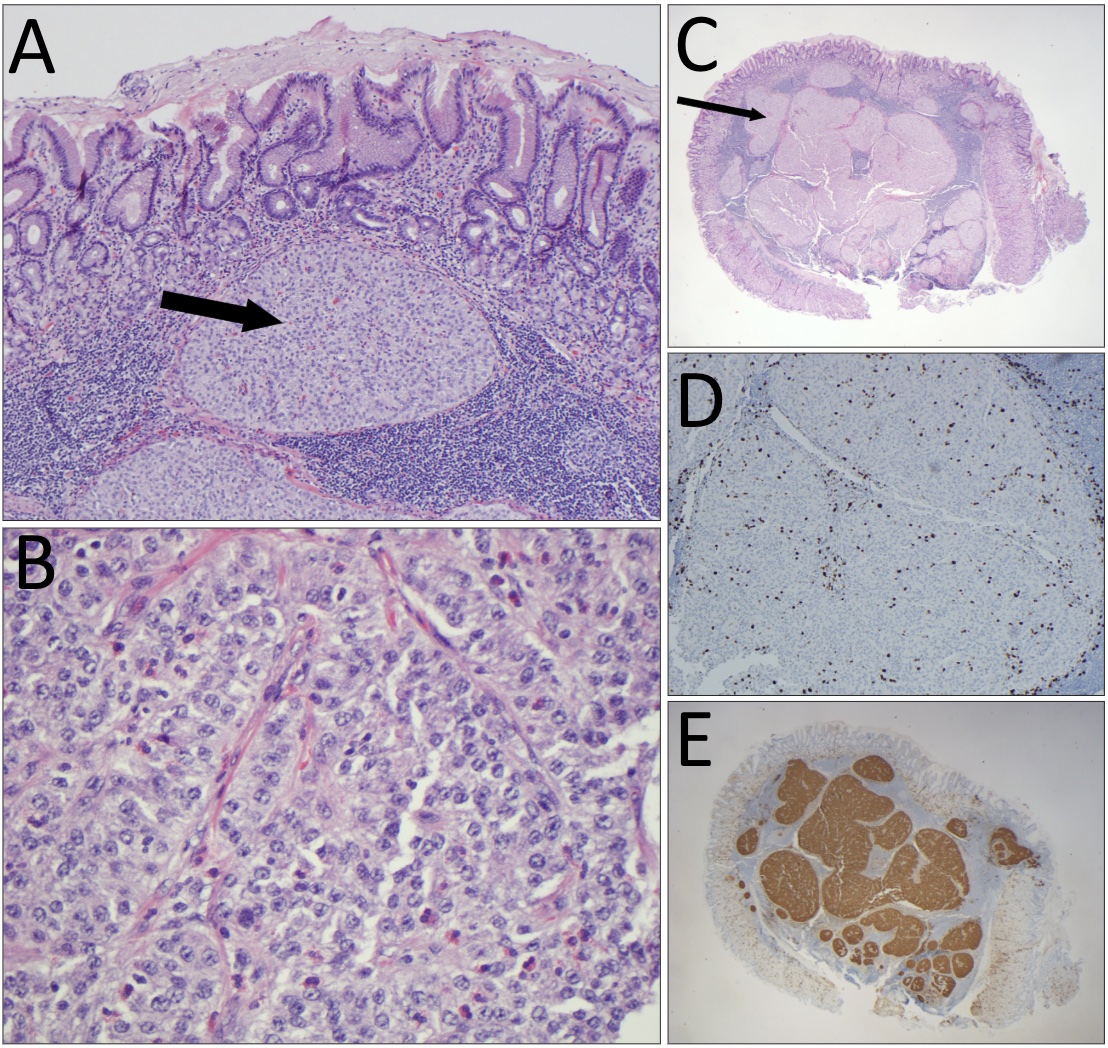Sunday Poster Session
Category: Stomach
P1678 - Iron Deficiency Anemia in a Pre-Menopausal Woman - Casting a Wide (g)NET!
Sunday, October 27, 2024
3:30 PM - 7:00 PM ET
Location: Exhibit Hall E

Has Audio
- SZ
Sarah Zimmer, MD, LT, MC, USN
Naval Medical Center Portsmouth
Portsmouth, VA
Presenting Author(s)
Sarah Zimmer, MD, LT, MC, USN1, Ashley Serjilus, MD, LT, MC, USN1, Amie Harvey, MD2, Bryan Keenan, MD2, Javier De Luca-Johnson, MD, LCDR, MC, USN1, Allison Bush, MD, MPH, LCDR, MC, USN1
1Naval Medical Center Portsmouth, Portsmouth, VA; 2Naval Medical Hospital Jacksonville, Jacksonville, FL
Introduction: Gastric Neuroendocrine tumors (GNETs) are rare neoplasms that arise from the neuroendocrine cells in the stomach. GNETs occur in 1-2 per 1,000,000 people, and there are four subtypes with different treatments and overall prognosis. Presenting symptoms of GNETs can vary, but anemia and dyspepsia often precede a diagnosis. The American Gastroenterological Association’s guideline on iron deficiency anemia (IDA) recommends bidirectional endoscopy in asymptomatic premenopausal women with IDA. We present a case of prolonged IDA in a pre-menopausal woman that was attributed to menorrhagia, resulting in a delayed diagnosis of GNETs.
Case Description/Methods: A 38-year-old female with 10 years of menorrhagia and IDA despite multiple intravenous iron infusions presented to the Gastroenterology clinic after a referral for scant hematochezia. Physical exam was unremarkable and labs revealed hemoglobin 10.3 g/dL, MCV 81 FL/cell, and ferritin 29 ng/mL. Colonoscopy was normal aside from grade I hemorrhoids, and EGD showed multiple 3-10mm polypoid lesions in the lesser curvature of the stomach. Pathology demonstrated GNETs with a Ki67 of 3.2%, up to 3 mitotic figures per 2mm^2, and gastrin level 22pg/mL. The overall subtype of GNET was unclear given mixed endoscopic and histologic findings. The patient underwent polypectomy and is undergoing periodic surveillance.
Discussion: Less than 10% of neuroendocrine tumors in the gastric mucosa. GNETs can be categorized into four groups based on endoscopy, histology, and gastrin level. Type 1 GNETs are often linked to atrophic gastritis or Helicobacter pylori infection. They tend to be well-differentiated and indolent, with a favorable prognosis. Type 2 GNETs are associated with multiple endocrine neoplasia type 1 syndrome and Zollinger-Ellison syndrome, and often have a more aggressive clinical course. Type 3 GNETs are sporadic, poorly differentiated and have a high potential for metastasis. Type 4 GNETs are associated with a background of atrophic gastritis, and are poorly differentiated with nearly a 100% risk of metastasis. Our patient had mixed features, not consistent with any one subtype, and her concurrent menorrhagia resulting in a potential 10-year delay in diagnosis, make her case particularly unique.
While GNETs are an rare cause of IDA, they should remain on the differential, particularly given their malignant nature. Our case highlights the importance of following the guidelines to prevent delayed diagnoses and adds to the literature of GNETs.

Note: The table for this abstract can be viewed in the ePoster Gallery section of the ACG 2024 ePoster Site or in The American Journal of Gastroenterology's abstract supplement issue, both of which will be available starting October 27, 2024.
Disclosures:
Sarah Zimmer, MD, LT, MC, USN1, Ashley Serjilus, MD, LT, MC, USN1, Amie Harvey, MD2, Bryan Keenan, MD2, Javier De Luca-Johnson, MD, LCDR, MC, USN1, Allison Bush, MD, MPH, LCDR, MC, USN1. P1678 - Iron Deficiency Anemia in a Pre-Menopausal Woman - Casting a Wide (g)NET!, ACG 2024 Annual Scientific Meeting Abstracts. Philadelphia, PA: American College of Gastroenterology.
1Naval Medical Center Portsmouth, Portsmouth, VA; 2Naval Medical Hospital Jacksonville, Jacksonville, FL
Introduction: Gastric Neuroendocrine tumors (GNETs) are rare neoplasms that arise from the neuroendocrine cells in the stomach. GNETs occur in 1-2 per 1,000,000 people, and there are four subtypes with different treatments and overall prognosis. Presenting symptoms of GNETs can vary, but anemia and dyspepsia often precede a diagnosis. The American Gastroenterological Association’s guideline on iron deficiency anemia (IDA) recommends bidirectional endoscopy in asymptomatic premenopausal women with IDA. We present a case of prolonged IDA in a pre-menopausal woman that was attributed to menorrhagia, resulting in a delayed diagnosis of GNETs.
Case Description/Methods: A 38-year-old female with 10 years of menorrhagia and IDA despite multiple intravenous iron infusions presented to the Gastroenterology clinic after a referral for scant hematochezia. Physical exam was unremarkable and labs revealed hemoglobin 10.3 g/dL, MCV 81 FL/cell, and ferritin 29 ng/mL. Colonoscopy was normal aside from grade I hemorrhoids, and EGD showed multiple 3-10mm polypoid lesions in the lesser curvature of the stomach. Pathology demonstrated GNETs with a Ki67 of 3.2%, up to 3 mitotic figures per 2mm^2, and gastrin level 22pg/mL. The overall subtype of GNET was unclear given mixed endoscopic and histologic findings. The patient underwent polypectomy and is undergoing periodic surveillance.
Discussion: Less than 10% of neuroendocrine tumors in the gastric mucosa. GNETs can be categorized into four groups based on endoscopy, histology, and gastrin level. Type 1 GNETs are often linked to atrophic gastritis or Helicobacter pylori infection. They tend to be well-differentiated and indolent, with a favorable prognosis. Type 2 GNETs are associated with multiple endocrine neoplasia type 1 syndrome and Zollinger-Ellison syndrome, and often have a more aggressive clinical course. Type 3 GNETs are sporadic, poorly differentiated and have a high potential for metastasis. Type 4 GNETs are associated with a background of atrophic gastritis, and are poorly differentiated with nearly a 100% risk of metastasis. Our patient had mixed features, not consistent with any one subtype, and her concurrent menorrhagia resulting in a potential 10-year delay in diagnosis, make her case particularly unique.
While GNETs are an rare cause of IDA, they should remain on the differential, particularly given their malignant nature. Our case highlights the importance of following the guidelines to prevent delayed diagnoses and adds to the literature of GNETs.

Figure: Figure A: (H&E, Medium Power, 100X):
The neuroendocrine tumor demonstrates nested and trabecular architecture
Associated with a brisk chronic inflammatory response with germinal centers
Nests of neuroendocrine cells (black arrow) were predominantly within the submucosa and extending to the biopsy base and focally into the lamina propria.
Figure B: (H&E, High Power, 400X):
Neuroendocrine cells: Bland cytology, Amphophilic cytoplasm, Isometric nuclear contours, Finely dispersed (“salt and pepper”) chromatin without nucleoli.
Mitotic figures are focally present and number less than 2 per 2 mm2.
No lymphovascular invasion is seen.
Figure C: (H&E, Low Power, 20X):
Gastric polyp, nests of neuroendocrine cells (arrow)
Gastric mucosa demonstrates oxyntic-type features.
The neuroendocrine tumor measures up to 4.5 mm in greatest microscopic dimension.
Figure D: (Ki-67, 100X):
Immunohistochemical stain for Ki-67: labelling index of 3.2%.
Histologic grade G2 assigned based on the Ki-67 index.
Figure E: (Chromogranin stain, 20X):
Neuroendocrine differentiation
Of note, the Synaptophysin stain had a similar result
The neuroendocrine tumor demonstrates nested and trabecular architecture
Associated with a brisk chronic inflammatory response with germinal centers
Nests of neuroendocrine cells (black arrow) were predominantly within the submucosa and extending to the biopsy base and focally into the lamina propria.
Figure B: (H&E, High Power, 400X):
Neuroendocrine cells: Bland cytology, Amphophilic cytoplasm, Isometric nuclear contours, Finely dispersed (“salt and pepper”) chromatin without nucleoli.
Mitotic figures are focally present and number less than 2 per 2 mm2.
No lymphovascular invasion is seen.
Figure C: (H&E, Low Power, 20X):
Gastric polyp, nests of neuroendocrine cells (arrow)
Gastric mucosa demonstrates oxyntic-type features.
The neuroendocrine tumor measures up to 4.5 mm in greatest microscopic dimension.
Figure D: (Ki-67, 100X):
Immunohistochemical stain for Ki-67: labelling index of 3.2%.
Histologic grade G2 assigned based on the Ki-67 index.
Figure E: (Chromogranin stain, 20X):
Neuroendocrine differentiation
Of note, the Synaptophysin stain had a similar result
Note: The table for this abstract can be viewed in the ePoster Gallery section of the ACG 2024 ePoster Site or in The American Journal of Gastroenterology's abstract supplement issue, both of which will be available starting October 27, 2024.
Disclosures:
Sarah Zimmer indicated no relevant financial relationships.
Ashley Serjilus indicated no relevant financial relationships.
Amie Harvey indicated no relevant financial relationships.
Bryan Keenan indicated no relevant financial relationships.
Javier De Luca-Johnson indicated no relevant financial relationships.
Allison Bush indicated no relevant financial relationships.
Sarah Zimmer, MD, LT, MC, USN1, Ashley Serjilus, MD, LT, MC, USN1, Amie Harvey, MD2, Bryan Keenan, MD2, Javier De Luca-Johnson, MD, LCDR, MC, USN1, Allison Bush, MD, MPH, LCDR, MC, USN1. P1678 - Iron Deficiency Anemia in a Pre-Menopausal Woman - Casting a Wide (g)NET!, ACG 2024 Annual Scientific Meeting Abstracts. Philadelphia, PA: American College of Gastroenterology.
